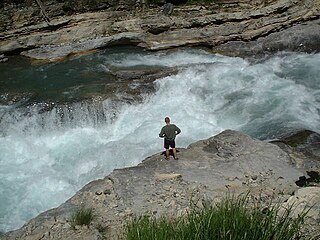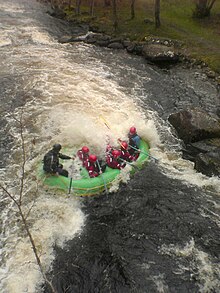
Whitewater forms in a rapid context, in particular, when a river's gradient changes enough to generate so much turbulence that air is trapped within the water. This forms an unstable current that froths, making the water appear opaque and white.

The River Dee is a river in the United Kingdom. The length of the main section from Bala to Chester is 113 km and it is largely located in Wales. The stretch between Aldford and Chester is within England, and two other sections form the border between the two countries.

Bala Lake is a large freshwater glacial lake in Gwynedd, Wales. The River Dee, which has its source on the slopes of Dduallt in the mountains of Snowdonia, feeds the 3.7 miles (6.0 km) long by 0.5 miles (0.8 km) wide lake. It was the largest natural body of water in Wales even before its level was raised by Thomas Telford to provide water for the Ellesmere Canal.

Bala is a town and community in Gwynedd, Wales. Formerly an urban district, Bala lies in the historic county of Merionethshire, at the north end of Bala Lake. According to the 2021 Census, Bala had a population of 1,999 and 72.5 per cent of the population could speak Welsh with a decrease of 6% since 2011.

The Tryweryn is a river in the north of Wales which starts at Llyn Tryweryn in the Snowdonia National Park and after 19 kilometres (12 mi) joins the river Dee at Bala. One of the main tributaries of the Dee, it was dammed in 1965 to form Llyn Celyn. The Tryweryn flooding forcibly removed residents of the village of Capel Celyn despite popular and political opposition in Wales. The resulting graffiti "Cofiwch Dryweryn" near Llanrhystud became and remains a popular icon of Welsh feeling. Water is stored in Llyn Celyn in winter when flows are high, and released over the summer to maintain the flow in the Dee (water from the Dee is used as the water supply for large areas of north-east Wales, and for the Wirral and much of Liverpool in England.
The Dee regulation scheme is a system of flow balancing and quality management along the River Dee managed by a consortium of the three largest water companies licensed to take water from the river, United Utilities, Welsh Water and Severn Trent Water; together with the regulator, Natural Resources Wales.

An artificial whitewater course (AWWC) is a site for whitewater canoeing, whitewater kayaking, whitewater racing, whitewater rafting, playboating and slalom canoeing with artificially generated rapids.

The River Vyrnwy is a river which flows through northern Powys, Wales, and Shropshire, England. The name derives from Severn, the river of which it is a tributary.

Llyn Celyn is a reservoir constructed between 1960 and 1965 including the highly controversial Tryweryn flooding in the valley of the River Tryweryn in Gwynedd, Wales. This included the forcible removal of the Capel Celyn village residents despite protest and opposition of Welsh MPs.

Llyn Brenig is a reservoir located on Denbigh Moors in North Wales. The artificial lake, which was constructed between 1973 and 1976, was created by building an embankment dam across the Afon Brenig valley. It lies at 1,200 ft (370 m) above sea level on the border between the counties of Conwy and Denbighshire. It is used to manage the flow in the River Dee as part of the River Dee regulation system.

The Tryweryn flooding or Tryweryn drowning, refers to the flooding of the rural community of Capel Celyn to the north west of Bala in Gwynedd, Wales, in the Afon Tryweryn valley. The village and other parts of the valley were flooded in 1965 to create Llyn Celyn reservoir, in order to supply Liverpool and Wirral with water for industry.

The Alwen Reservoir is a 5 kilometres (3 mi) long reservoir near Pentre-Llyn-Cymmer in Conwy County Borough, Wales.
Canoe Wales is the national governing body for paddlesport in Wales. It covers all branches of the sport from recreational canoeing, kayaking, stand up paddleboarding and rafting to whitewater racing, slalom racing and wildwater racing; flatwater sprint racing and marathon racing; canoe sailing; canoe polo; surf kayaking and canoeing; and extreme racing. The organisation has over 2,700 members including individual paddlers as well as affiliated club members. Full adult members of Canoe Wales are also by default Welsh members of British Canoeing.
Capel Celyn Halt was a solely passenger railway station which served the rural area of Capel Celyn west of Bala. It was on the Great Western Railway's (GWR's) Bala Ffestiniog Line in Gwynedd, Wales.

The Nymboida River, a perennial stream of the Clarence River catchment, is located in the Northern Rivers region of New South Wales, Australia.
Tyddyn Bridge Halt was a railway station which served the village of Frongoch, Gwynedd, Wales. It was on the Great Western Railway's (GWR's) Bala Ffestiniog Line in Gwynedd, Wales.

Cardiff International White Water is an Olympic standard white water rafting centre based at the Cardiff International Sports Village in Cardiff Bay.

Canoeing – recreational boating activity or paddle sport in which you kneel or sit facing forward in an open or closed-decked canoe, and propel yourself with a single-bladed paddle, under your own power.


















